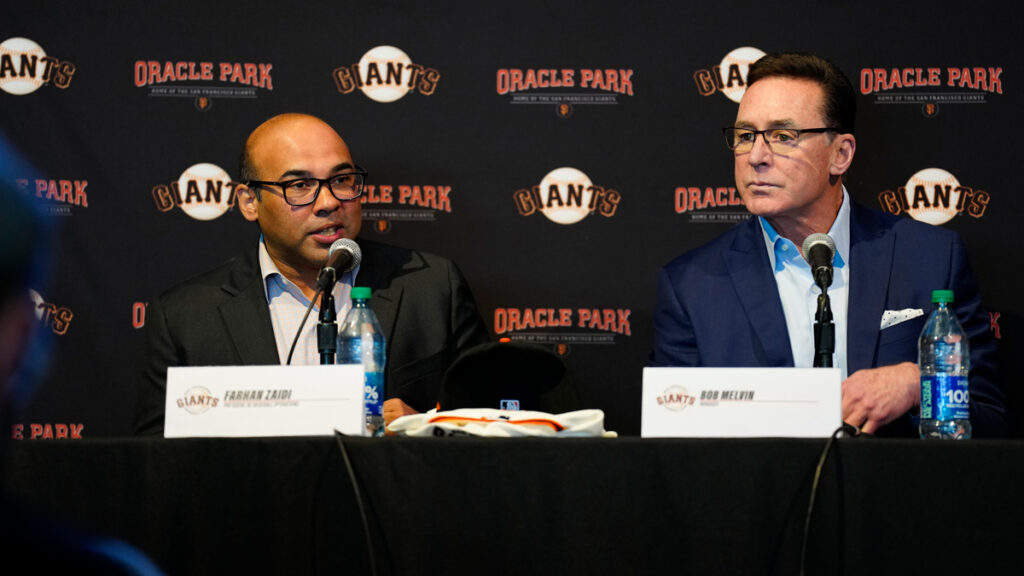Zaidi Clarifies Giants’ Melvin Roster Controversy After His Firing originally appeared on NBC Sports Bay Area
Farhan Zaidi understands criticism of his six-year mandate as president of baseball operations for the Giants.
He was fired after another disappointing 2024 MLB seasonand he spoke to Shayna Rubin of the San Francisco Chronicle for the first time publicly since its release.
“The autopsy is never pretty, and for me it’s not productive to respond to all the stories that are out there,” Zaidi said in a phone conversation with Rubin. “I will say that during my time in the organization, I was fully committed to this work and did it without ulterior motives or agendas. I always tried to treat people with respect and be a good ambassador to the Giants community.
“Beyond that, people are passionate about the Giants and professional sports, and there’s always going to be a discourse about those things. And that’s the nature of the beast.”
A hot topic that arose after Zaidi’s departure was San Francisco’s rosters, which became increasingly controversial after Giants icon Will Clark, who serves as a special assistant on the team, in spoke in a recent podcast.
Clark said Zaidi made up the team’s roster and “had his hand in everything.”
“(Manager) Bob Melvin would want this guy in the lineup, this guy in the lineup and Farhan would take it,” Clark said on the podcast. “You settle down, because that’s Melvin’s job.”
But Zaidi explained to Rubin how the lineups were decided.
“I recognize there are a lot of lingering frustrations following a disappointing season,” Zaidi told Rubin. “I mean, for me in my 20 years of baseball, last year was probably the most disappointing season given the expectations that we had going into the year with the offseason that we had and how it took place.
“But one thing that has always been important to me over my years in baseball, and certainly my six years with the Giants, is having strong collaboration between different parts of the organization. Whether between player development and the front office or the clubhouse and the coaching staff, the manager and the front office, I certainly believe that was the case last year.”
Melvin also spoke with Rubin and acknowledged that Zaidi was “passionate” about the roster, but the collaborative dynamic was unlike anything he had experienced before during his baseball career.
Zaidi and Melvin, whose relationship goes back well before their union with the Giants, said they both had a say in the roster-making process — something that was important to both of them.
“I have a long-standing relationship with Bob. I think we understand each other very well,” Zaidi told Rubin. “Because of the circumstances of the time and the way he was hired, it was really important that our relationship worked well. So I saw his feedback very regularly throughout the season to find out if the front office dynamic with him and the coaching staff was working.
“Based on the feedback I received from him, I’m confident it worked well. We certainly talked about scheduling and game strategy like the most effective partnerships between the front office and managers do There was always an exchange of ideas that if one of us felt strongly about something or another because of our history, there was a lot of respect for that but ultimately I had the feeling. that as a manager, it was his role to have the final say on alignments.
With a year remaining on his contractthe Giants part ways with Zaidi and hired major franchiser Buster Posey as his replacement.
Melvin also hopes to collaborate with Posey and new general manager Zack Minasian on training in 2025. Posey even said that he and Melvin have already discussed it, agreeing on a mutual dialogue around training, but Melvin will have the last word.
“Bob has been doing this for 30 years,” Posey told KNBR in an interview last week. “Bob and I have talked about it before. He wants to talk about this. But at the end of the day, he’s been in the dugout and (is) reading his players better than me, without being with them all the time.
“We’re going to use analytics. I talked to BoMel about it: ‘How do we want this to play out?’ Let the projections spit out what they should be, look at them, then you write the lineup.”? Or do you write the lineup and then look at the projections? Ultimately, I leave it up to him. I want my manager uses his years and years of experience to write the composition.

